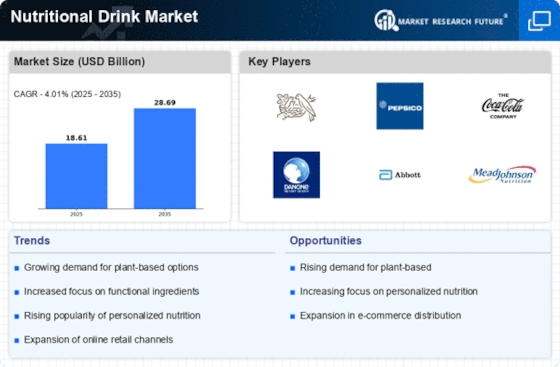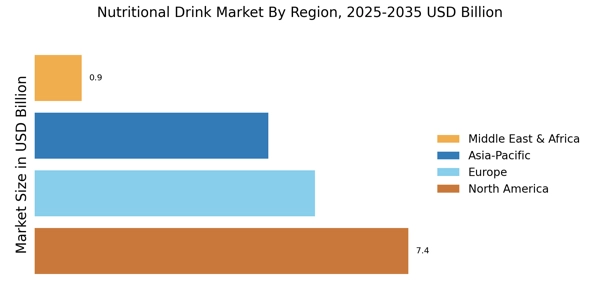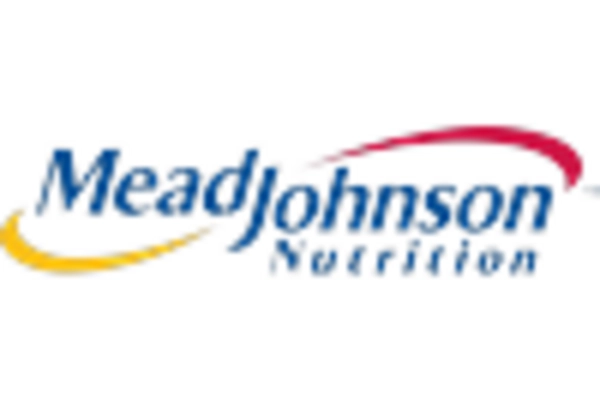Increasing Health Consciousness
The rising awareness of health and wellness among consumers appears to be a pivotal driver for the Nutritional Drink Market. As individuals become more informed about the benefits of nutrition, they are increasingly seeking products that align with their health goals. This trend is reflected in the growing demand for nutritional drinks that offer essential vitamins, minerals, and other beneficial ingredients. Market data indicates that the nutritional drink segment is projected to grow at a compound annual growth rate of approximately 7% over the next five years. This shift towards healthier lifestyles suggests that consumers are willing to invest in products that promote overall well-being, thereby propelling the Nutritional Drink Market forward.
Innovation in Product Formulation
Innovation in product formulation is another significant driver influencing the Nutritional Drink Market. Manufacturers are continuously exploring new ingredients and formulations to cater to diverse consumer preferences and dietary needs. For instance, the introduction of protein-enriched drinks, low-sugar options, and functional beverages that support specific health outcomes has gained traction. According to recent market analysis, the demand for protein-based nutritional drinks has surged, with a notable increase in sales attributed to fitness enthusiasts and health-conscious individuals. This trend indicates that innovation not only enhances product appeal but also plays a crucial role in expanding the consumer base within the Nutritional Drink Market.
Aging Population and Nutritional Needs
The demographic shift towards an aging population is likely to have a profound impact on the Nutritional Drink Market. As the global population ages, there is an increasing need for products that address the specific nutritional requirements of older adults. Nutritional drinks that provide essential nutrients, support bone health, and enhance cognitive function are becoming increasingly popular among this demographic. Market data suggests that the segment targeting seniors is expected to witness substantial growth, driven by the rising prevalence of age-related health issues. This demographic trend indicates a promising opportunity for the Nutritional Drink Market to develop tailored products that meet the unique needs of older consumers.
Sustainability and Ethical Consumption
Sustainability and ethical consumption are emerging as critical drivers in the Nutritional Drink Market. Consumers are becoming more conscious of the environmental impact of their purchasing decisions, leading to a preference for products that are sustainably sourced and produced. Nutritional drinks that utilize eco-friendly packaging and ethically sourced ingredients are gaining popularity among environmentally aware consumers. Market data indicates that brands emphasizing sustainability are likely to experience increased loyalty and sales, as consumers align their values with their purchasing choices. This trend suggests that the Nutritional Drink Market must prioritize sustainable practices to remain competitive and appeal to the growing segment of eco-conscious consumers.
Rise of Convenience and On-the-Go Consumption
The fast-paced lifestyle of modern consumers has led to a growing demand for convenience in food and beverage options, significantly impacting the Nutritional Drink Market. Busy individuals are increasingly seeking ready-to-drink nutritional beverages that can be consumed on-the-go, aligning with their hectic schedules. This trend is reflected in the rising sales of single-serve packaging and portable nutritional drinks. Market Research Future indicates that convenience-oriented products are expected to capture a larger share of the market, as consumers prioritize ease of use without compromising on nutrition. This shift towards convenience suggests that the Nutritional Drink Market must adapt to meet the evolving preferences of time-strapped consumers.

















